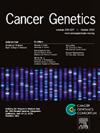11. Developing a robust bioinformatics workflow to support personalized neoantigen vaccine clinical trials
IF 1.4
4区 医学
Q4 GENETICS & HEREDITY
引用次数: 0
Abstract
Personalized cancer vaccines (PCVs) leverage immunogenomics strategies to combat cancer. Somatic mutations in tumor cells generate neoantigens that may get presented on the tumor cell's surface by MHC molecules. Immunotherapies target neoantigens to stimulate tumor-specific immune responses. Our bioinformatics workflow has designed vaccines for over 170 patients across 11 of the 180 neoantigen vaccine trials on clinicaltrials.gov.
Despite the rise in PCV-related interventions, gaps in established protocols addressing the complexities associated with the design of PCVs still remain. Here, we summarize our bioinformatics pipeline and describe measures taken to ensure robust support for clinical trials at Washington University. Our Google Cloud immunotherapy pipeline (open MIT license) to predict neoantigen epitopes is implemented in Workflow Definition Language and containerized using Docker to ensure portability and reliability. The pVACtools software suite (pvactools.org) that carries out neoantigen identification and prioritization, is developed and updated following industry best practices including version control (Git), formal code review, automated unit and integration tests, and benchmark tests. The final steps of the bioinformatics workflow generate files recording the analysis parameters and QC results tailored to the FDA's requests. Candidates generated by the pipeline are reviewed at an Immunogenomics Tumor Board using the pVACview tool. Prioritized candidates undergo a rigorous examination of data QC metrics, variant support at genomic and transcriptomic levels, MHC binding prediction algorithms, and HLA allele concordance between the clinical data and in-silico prediction tools. Finally, a long-peptide order form generated by the pipeline is sent to the vaccine manufacturer for synthesis.
11.开发强大的生物信息学工作流程以支持个性化新抗原疫苗临床试验
个性化癌症疫苗(PCV)利用免疫基因组学策略抗击癌症。肿瘤细胞中的体细胞突变会产生新抗原,这些新抗原可通过 MHC 分子呈现在肿瘤细胞表面。免疫疗法以新抗原为目标,刺激肿瘤特异性免疫反应。我们的生物信息学工作流程已为临床试验网(clinicaltrials.gov)上 180 项新抗原疫苗试验中 11 项试验的 170 多名患者设计了疫苗。尽管 PCV 相关干预措施不断增加,但在解决 PCV 设计相关复杂性的既定方案方面仍存在差距。在此,我们总结了我们的生物信息学管道,并介绍了华盛顿大学为确保为临床试验提供有力支持而采取的措施。我们预测新抗原表位的谷歌云免疫疗法管道(开放 MIT 许可)是用工作流定义语言实现的,并使用 Docker 进行了容器化,以确保可移植性和可靠性。进行新抗原鉴定和优先排序的 pVACtools 软件套件(pvactools.org)的开发和更新遵循行业最佳实践,包括版本控制(Git)、正式代码审查、自动单元测试和集成测试以及基准测试。生物信息学工作流程的最后步骤是生成文件,记录分析参数和符合 FDA 要求的质量控制结果。免疫组学肿瘤委员会使用 pVACview 工具对管道生成的候选样本进行审查。排序优先的候选者将接受严格的数据质量控制指标、基因组和转录组水平的变异支持、MHC 结合预测算法以及临床数据与实验室内预测工具之间的 HLA 等位基因一致性检查。最后,流水线生成的长肽订购单将发送给疫苗制造商进行合成。
本文章由计算机程序翻译,如有差异,请以英文原文为准。
求助全文
约1分钟内获得全文
求助全文
来源期刊

Cancer Genetics
ONCOLOGY-GENETICS & HEREDITY
CiteScore
3.20
自引率
5.30%
发文量
167
审稿时长
27 days
期刊介绍:
The aim of Cancer Genetics is to publish high quality scientific papers on the cellular, genetic and molecular aspects of cancer, including cancer predisposition and clinical diagnostic applications. Specific areas of interest include descriptions of new chromosomal, molecular or epigenetic alterations in benign and malignant diseases; novel laboratory approaches for identification and characterization of chromosomal rearrangements or genomic alterations in cancer cells; correlation of genetic changes with pathology and clinical presentation; and the molecular genetics of cancer predisposition. To reach a basic science and clinical multidisciplinary audience, we welcome original full-length articles, reviews, meeting summaries, brief reports, and letters to the editor.
 求助内容:
求助内容: 应助结果提醒方式:
应助结果提醒方式:


